Development of rapid and simple FCoV RNA detection systems using RT-PCR and RT-RPA combined with STH-PAS to diagnose FIP in cats
IF 1.6
4区 医学
Q3 BIOCHEMICAL RESEARCH METHODS
引用次数: 0
Abstract
Feline infectious peritonitis (FIP) is a fatal disease in cats that is caused by feline coronavirus (FCoV). FCoV RT-qPCR is widely used to diagnose FIP due to its high sensitivity and ability to quantify FCoV RNA. However, its convenience is limited by the need for expensive equipment and/or processing at external laboratories. We herein developed two rapid and simple FCoV RNA detection systems: one combining conventional RT-PCR with the Single Tag Hybridization-Printed Array Strip (STH-PAS) method (the RT-PCR and STH-PAS system) and the other combining RT-RPA, an isothermal nucleic acid amplification method, with STH-PAS (the RT-RPA and STH-PAS system). Evaluations using FCoV RNA standards showed that the limit of detection for the RT-PCR and STH-PAS system was 104.2 copies/reaction, while that for the RT-RPA and STH-PAS system was 104 copies/reaction. The clinical performance of these systems was also examined using clinical samples from cats suspected of having FIP and compared to the conventional FCoV RT-qPCR genetic test. The results obtained showed a sensitivity of 66.7 % (95 % CI: 41.0–86.7) and specificity of 100 % (95 %CI: 9.4–100). These systems are a faster and simpler alternative to conventional methods, suggesting their potential in point-of-care testing in veterinary clinics.
利用RT-PCR和RT-RPA联合STH-PAS快速简便的FCoV RNA检测系统诊断猫FIP
猫传染性腹膜炎(FIP)是由猫冠状病毒(FCoV)引起的猫的一种致命疾病。FCoV RT-qPCR因其高灵敏度和定量FCoV RNA的能力被广泛用于FIP的诊断。然而,由于需要昂贵的设备和/或外部实验室的处理,其便利性受到限制。本文开发了两种快速简便的FCoV RNA检测系统:一种是将传统RT-PCR与单标签杂交-印刷阵列条带(STH-PAS)方法(RT-PCR和STH-PAS系统)相结合,另一种是将等温核酸扩增方法RT-RPA与STH-PAS相结合(RT-RPA和STH-PAS系统)。采用FCoV RNA标准品评价,RT-PCR和STH-PAS体系的检出限为104.2拷贝/反应,RT-RPA和STH-PAS体系的检出限为104拷贝/反应。还使用疑似患有FIP的猫的临床样本检查了这些系统的临床性能,并与传统的FCoV RT-qPCR基因检测进行了比较。结果显示,敏感性为66.7 %(95 %CI: 41.0 ~ 86.7),特异性为100 %(95 %CI: 9.4 ~ 100)。这些系统是传统方法的一种更快、更简单的替代方法,这表明它们在兽医诊所的即时检测中具有潜力。
本文章由计算机程序翻译,如有差异,请以英文原文为准。
求助全文
约1分钟内获得全文
求助全文
来源期刊
CiteScore
5.80
自引率
0.00%
发文量
209
审稿时长
41 days
期刊介绍:
The Journal of Virological Methods focuses on original, high quality research papers that describe novel and comprehensively tested methods which enhance human, animal, plant, bacterial or environmental virology and prions research and discovery.
The methods may include, but not limited to, the study of:
Viral components and morphology-
Virus isolation, propagation and development of viral vectors-
Viral pathogenesis, oncogenesis, vaccines and antivirals-
Virus replication, host-pathogen interactions and responses-
Virus transmission, prevention, control and treatment-
Viral metagenomics and virome-
Virus ecology, adaption and evolution-
Applied virology such as nanotechnology-
Viral diagnosis with novelty and comprehensive evaluation.
We seek articles, systematic reviews, meta-analyses and laboratory protocols that include comprehensive technical details with statistical confirmations that provide validations against current best practice, international standards or quality assurance programs and which advance knowledge in virology leading to improved medical, veterinary or agricultural practices and management.

 求助内容:
求助内容: 应助结果提醒方式:
应助结果提醒方式:


